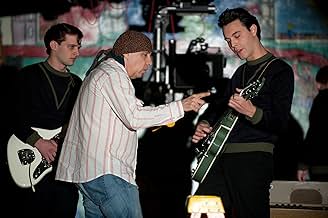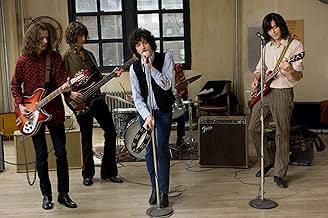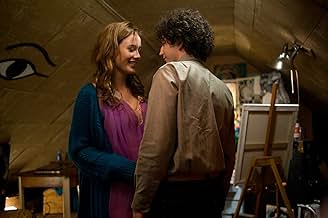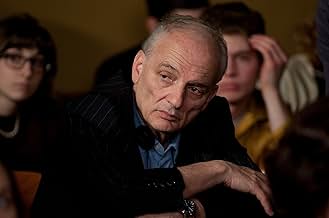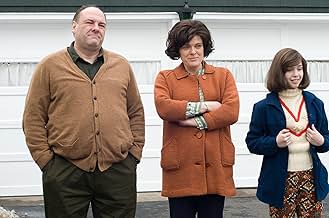IMDb-BEWERTUNG
6,0/10
5055
IHRE BEWERTUNG
Rock 'n' Roll Coming-of-Age-Story über eine Gruppe von Vorstadt-Teens in einer 60er-Jahre Rockband.Rock 'n' Roll Coming-of-Age-Story über eine Gruppe von Vorstadt-Teens in einer 60er-Jahre Rockband.Rock 'n' Roll Coming-of-Age-Story über eine Gruppe von Vorstadt-Teens in einer 60er-Jahre Rockband.
- Auszeichnungen
- 3 Gewinne & 3 Nominierungen insgesamt
Christopher Bannow
- Dave Smith
- (as Chris Bannow)
Empfohlene Bewertungen
David Chase's Not Fade Away is an exercise in nostalgia in a competent order, meaning that those who enjoy or, above all, relate to the events in the film will appreciate it the most. I'm stuck in the position where I often find my self; on the corner of admiration and disappointment.
Stylistically, David Chase (TV's The Soprano's) and cinematographer Eigil Bryld (Netflix's own TV series House of Cards) couldn't have made a more bleeding-gums representation of the 1960's if they tried. It looks marvelous in all its polished, minimalist glory. Thematically and applicably, there should've been so much more of a story to tell about a garage band that never made it despite determination to "not fade away." For this reason, the film can be viewed as one where talents embrace culture, chew scenery, and nothing more.
The story concerns Douglas (John Magaro), a young man in the 1960's during a time of The Vietnam War and inevitable social change. Family values and daintiness are becoming more lenient, and views on the war divide parents, who sat back and formed opinions on it, and teenagers who had to fight it. Douglas decides to round up a few pals and start a garage band with intent to "make it big" like the iconic Beatles and Rolling Stones. Faced with loud opposition from his demanding bigot of a father (James Gandolfini) and attachment to his girlfriend (Meg Guzulescu), Douglas must now keep a band together without alienating those close to him.
This is a story that through heatbreak, aspirations, and prolific failures could've made a gripping film and possibly an emotional one. The downside is through Chase's direction does the film feel sterile and ill-equipped. He doesn't seem to possess any form of relation or personal resonance with his characters, and this awkward coldness halts the film's ability to allow its audience to admire if even differentiate the teenagers the sixties was known to birth.
What we are left with, predominately, is an egg with a firm, ambitious, beautifully crisp shell, but sub-par, underwhelming contents. "Style over substance" would seem to be an appropriate term, but I hesitate to even call it that seeing as social order, parental discrepancies, and culture shock - all easy items to exclude or nudge out of bounds - are touched on and explored considerably. One of the tensest scenes, and arguably the best, is when Douglas is at dinner with many of his relatives, remaining silent while they discuss emerging culture and minorities in a wonderfully ethnocentric way. Douglas is ostracized and belittled for his optimism on his garage band project and his long, "hippie" hair before telling off his father and exiting the room.
Chase definitely understands complex changes of norms and societal disconnect between parents and youths. However, his apparent lack of interest in his characters, giving them a shocking lack of depth and personality, undermines the power Not Fade Away could've head if it resonated with its target audience (those now in their forties or fifties). Yet, its characters are as vacant as clip-art pictures of teenagers from the time period. There's a powerful, life-affirming, deeply involving story in the material Not Fade Away provides and I anxiously await its telling by a director with more of an attitude and opinion on the subject.
Starring: John Magaro, Meg Guzulescu, and James Gandolfini. Directed by: David Chase.
Stylistically, David Chase (TV's The Soprano's) and cinematographer Eigil Bryld (Netflix's own TV series House of Cards) couldn't have made a more bleeding-gums representation of the 1960's if they tried. It looks marvelous in all its polished, minimalist glory. Thematically and applicably, there should've been so much more of a story to tell about a garage band that never made it despite determination to "not fade away." For this reason, the film can be viewed as one where talents embrace culture, chew scenery, and nothing more.
The story concerns Douglas (John Magaro), a young man in the 1960's during a time of The Vietnam War and inevitable social change. Family values and daintiness are becoming more lenient, and views on the war divide parents, who sat back and formed opinions on it, and teenagers who had to fight it. Douglas decides to round up a few pals and start a garage band with intent to "make it big" like the iconic Beatles and Rolling Stones. Faced with loud opposition from his demanding bigot of a father (James Gandolfini) and attachment to his girlfriend (Meg Guzulescu), Douglas must now keep a band together without alienating those close to him.
This is a story that through heatbreak, aspirations, and prolific failures could've made a gripping film and possibly an emotional one. The downside is through Chase's direction does the film feel sterile and ill-equipped. He doesn't seem to possess any form of relation or personal resonance with his characters, and this awkward coldness halts the film's ability to allow its audience to admire if even differentiate the teenagers the sixties was known to birth.
What we are left with, predominately, is an egg with a firm, ambitious, beautifully crisp shell, but sub-par, underwhelming contents. "Style over substance" would seem to be an appropriate term, but I hesitate to even call it that seeing as social order, parental discrepancies, and culture shock - all easy items to exclude or nudge out of bounds - are touched on and explored considerably. One of the tensest scenes, and arguably the best, is when Douglas is at dinner with many of his relatives, remaining silent while they discuss emerging culture and minorities in a wonderfully ethnocentric way. Douglas is ostracized and belittled for his optimism on his garage band project and his long, "hippie" hair before telling off his father and exiting the room.
Chase definitely understands complex changes of norms and societal disconnect between parents and youths. However, his apparent lack of interest in his characters, giving them a shocking lack of depth and personality, undermines the power Not Fade Away could've head if it resonated with its target audience (those now in their forties or fifties). Yet, its characters are as vacant as clip-art pictures of teenagers from the time period. There's a powerful, life-affirming, deeply involving story in the material Not Fade Away provides and I anxiously await its telling by a director with more of an attitude and opinion on the subject.
Starring: John Magaro, Meg Guzulescu, and James Gandolfini. Directed by: David Chase.
David Chase's anticipated Not Fade Away not only jumbles itself into an indulgent story, constantly keeping the audience at an arm's length but it's overly stretched and uneven not utilizing the strong talents in the film like James Gandolfini, Jack Huston, and John Magaro. A natural comparison to Almost Famous (2000), the film doesn't hold a candle to Cameron Crowe's homage to music. Showcasing outstanding music of the 1960′s and 1970′s, Chase manages to capture moments of the young adolescent mind longing to be more. Lead Magaro delivers a character transformation of mind and body, a turn that elevates the film considerably. The great Jack Huston, an actor that will likely be one of the biggest things in Hollywood any minute now, delivers an aggressive supporting turn reminiscent of Channing Tatum's work in A Guide to Recognizing Your Saints (2006). Bella Heathcote shows tenderness and promise but undervalued and virtually unused. James Gandolfini, stands out with charisma and garners much of the big laughs. A great character actor like Gandolfini should be given room to move. The film ultimately fails because it never feels like Chase knows his film or where he wants it to go. The last twenty minutes feel unneeded, unearned, and thrown together for an "artistic" catalyst with no emotional or technical effect whatsoever. A large disappointment.
"Not Fade Away" is one of those movies that leaves you with a bad taste after you watch the movie; it's like watching a movie by the resident cool kid in town, straddling the prettiest girl in one hand and on the other hand, going on about how he overcame his meager upbringing, dysfunctional family, disloyal friends to become who he is. The story might be genuine and the tribulations might be authentic but it's just the way it is told that makes it so unlikeable.
The movie does not have an ending (just an absurd tacked on one), creates handfuls of subplots that it never bothers to resolve and indulges heavily in the writer/director's own world of self-references and pointless pettiness. After furiously producing subplots like it's a pilot of a TV show it just ends, giving that unresolved what-ever-happened-to feeling that as a moviegoer I hate. The young Italian-American protagonist who is probably the writer/director himself doesn't have a real story to tell or a point to make. The story just meanders on and on, the key tension points leading absolutely nowhere. Rather than create a compelling story, the movie demands some sort of adulation for what it presents and ultimately insults the viewer assuming the viewer should feel privileged to hear the story rather than earning its merits.
"Not Fade Away" is advertised as a movie about a band trying to make it big; however this movie is more of a bizarre bake of 60s set pieces. There is the vintage music equipment show - the Rickenbachers, the Gretchs, the vintage Fenders and others; the vintage car show and then the 60s records - primarily an obsession with the Rolling Stones that are displayed in their big, shiny and loud glory. While the audience who were teenagers in the 60s might appreciate the shiny items of desire, the rest will find these shiny objects do not fill up a movie or compensate for a story. It's like a glossy vintage advertising brochure - pretty girls, rebellious rock stars and shiny things but not a story to tell.
The other major problem in the movie is the absolute opacity of its sub-characters. The father, the mother, the girlfriend, the band mates, the girlfriend's sister, the families are completely and utterly opaque. They keep doing bizarre things without showing or being to infer why they are doing what they are doing. Perhaps it's some sort of a 60s thing, a band thing, an Italian-American thing or a 60s band thing but I wouldn't know. The movie doesn't bother to really explain or resolve anything and it just bubbles up here and there and then it's gone. The movie is just a sequence of these strung together and it just makes all the characters unlikeable and tiring.
I like rock and roll movies but in this movie rock music neither serves as a backdrop for a personal story nor tells a story about the rock and roll greatness. The 60s backdrop overpowers the movie and the story feels like it's about a bunch of teenagers so in love with themselves that they feel they are the privileged ones. One scene comes to mind; an aunt comments, "I hear rock and roll keeps you young" to which our protagonist churlishly replies, "rock and roll is an art form. Does Dostoyevsky keep you young?"
The movie does not have an ending (just an absurd tacked on one), creates handfuls of subplots that it never bothers to resolve and indulges heavily in the writer/director's own world of self-references and pointless pettiness. After furiously producing subplots like it's a pilot of a TV show it just ends, giving that unresolved what-ever-happened-to feeling that as a moviegoer I hate. The young Italian-American protagonist who is probably the writer/director himself doesn't have a real story to tell or a point to make. The story just meanders on and on, the key tension points leading absolutely nowhere. Rather than create a compelling story, the movie demands some sort of adulation for what it presents and ultimately insults the viewer assuming the viewer should feel privileged to hear the story rather than earning its merits.
"Not Fade Away" is advertised as a movie about a band trying to make it big; however this movie is more of a bizarre bake of 60s set pieces. There is the vintage music equipment show - the Rickenbachers, the Gretchs, the vintage Fenders and others; the vintage car show and then the 60s records - primarily an obsession with the Rolling Stones that are displayed in their big, shiny and loud glory. While the audience who were teenagers in the 60s might appreciate the shiny items of desire, the rest will find these shiny objects do not fill up a movie or compensate for a story. It's like a glossy vintage advertising brochure - pretty girls, rebellious rock stars and shiny things but not a story to tell.
The other major problem in the movie is the absolute opacity of its sub-characters. The father, the mother, the girlfriend, the band mates, the girlfriend's sister, the families are completely and utterly opaque. They keep doing bizarre things without showing or being to infer why they are doing what they are doing. Perhaps it's some sort of a 60s thing, a band thing, an Italian-American thing or a 60s band thing but I wouldn't know. The movie doesn't bother to really explain or resolve anything and it just bubbles up here and there and then it's gone. The movie is just a sequence of these strung together and it just makes all the characters unlikeable and tiring.
I like rock and roll movies but in this movie rock music neither serves as a backdrop for a personal story nor tells a story about the rock and roll greatness. The 60s backdrop overpowers the movie and the story feels like it's about a bunch of teenagers so in love with themselves that they feel they are the privileged ones. One scene comes to mind; an aunt comments, "I hear rock and roll keeps you young" to which our protagonist churlishly replies, "rock and roll is an art form. Does Dostoyevsky keep you young?"
David Chase's "Not Fade Away" looks at what it was like to come of age in the '60s. The main focus is a New Jersey teenager who decides to join a band, but there are clear signs of everything that was going on: the Vietnam War, the generation gap, racial tensions, and Dean Martin's mean-spirited comment about the Beatles. Contrary to the previous reviewer, I would say that this movie is better than "Almost Famous". The latter was too fluffy and came across as a sanitized look at its era. This one is very upfront about what sorts of things happened (including some very tense scenes). And the final line poses a good question about how we as Americans want to be known to the world. Can we eventually look to our best qualities to do what's right?
Anyway, this is a good movie. It's got great music and brings up some important points. I recommend it.
Anyway, this is a good movie. It's got great music and brings up some important points. I recommend it.
As with most filmmakers who work in themes, you should watch this to see Chase's perspective on the material, not for the story itself. Its seemingly formless structure will throw off some viewers, but it's very much in line with his body of work, being less about the music and the era and more about the effects of the passage of time, specifically the tug of the past on the present and the evolution of character (or not) as the years go by. It's an autobiographical elaboration on the themes in the dark and sad final seasons of the Sopranos, though it does have plenty of the usual witty Chase touches as well, like the kids dancing away the JFK retrospective. There's a pervasive sense of nostalgia because the setting feels realistic, neither idealistic like a Spielberg/Lucas movie nor revisionist like the progressive Pleasantville-type movies whose intention is to show us all how the past wasn't as enlightened as today. The downside is that it's such a well-covered period and milieu (for my generation The Wonder Years is the reference point) that it's hard to find something original to say. But go in with the understanding that it's more complex than it appears and it'll give you plenty to chew on afterward. At one point the lead and his girlfriend are watching Blow-Up and he comments on how strange it is there's no music to tell you when someone's going to get killed, and she replies that the sound of the wind in the trees is the music, which sums up this movie pretty well.
Wusstest du schon
- WissenswertesMost feature films slot 1-2 percent of production costs for the music budget, but in "Fade', music supervisor Steven Van Zandt, had about 10% of the $20-million-plus budget or at least $2 million.
- PatzerNobody said "elementary school" in North Jersey, at least not those days. Grades 1-6 (or 1-8 if you went to Catholic school) was called "grammar school."
- VerbindungenFeatures Süd Pazifik (1958)
- SoundtracksPeppermint Twist
Written by Joey Dee (as Joseph Di Nicola) and Henry Glover
Performed by Joey Dee and The Starliters
Courtesy of Rhino Entertainment Company
By arrangement with Warner Music Group Film & TV Licensing
Top-Auswahl
Melde dich zum Bewerten an und greife auf die Watchlist für personalisierte Empfehlungen zu.
- How long is Not Fade Away?Powered by Alexa
Details
Box Office
- Budget
- 20.000.000 $ (geschätzt)
- Bruttoertrag in den USA und Kanada
- 610.792 $
- Eröffnungswochenende in den USA und in Kanada
- 19.182 $
- 23. Dez. 2012
- Weltweiter Bruttoertrag
- 636.399 $
- Laufzeit1 Stunde 57 Minuten
- Farbe
- Sound-Mix
- Seitenverhältnis
- 1.85 : 1
Zu dieser Seite beitragen
Bearbeitung vorschlagen oder fehlenden Inhalt hinzufügen





